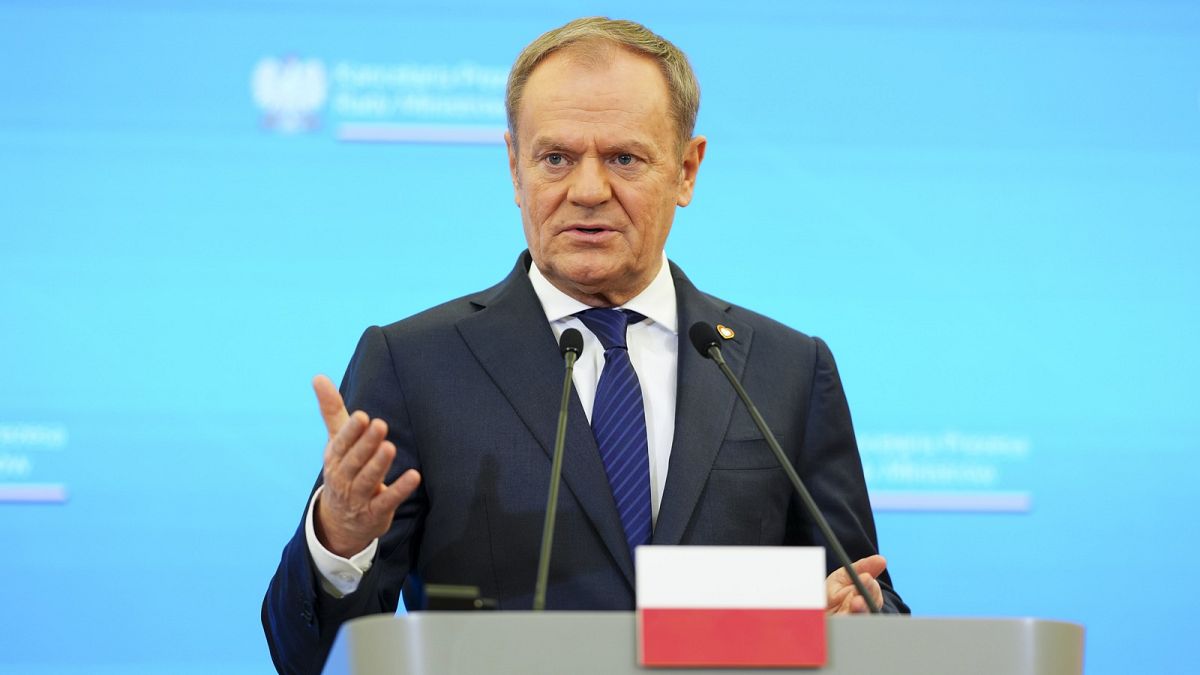Europe
Tusk calls for EU to confiscate Russian assets to finance Ukraine

The EU’s Frozen Russian Assets: A Potential Lifeline for Ukraine
The European Union has frozen approximately €210 billion in assets belonging to the Russian Central Bank, primarily held in Belgium, as part of its sanctions against Russia. These funds were initially intended to be used for extraordinary revenues, providing financial and military assistance to Ukraine amidst the ongoing conflict. However, the idea of confiscating these assets to directly finance Ukraine’s support has gained traction, particularly from Polish Prime Minister Donald Tusk. Tusk has actively called for the EU to take bold action, emphasizing the need to move beyond discussions and implement concrete measures. He suggested that the frozen assets could serve as a direct source of funding for Ukraine’s aid, urging the EU to "finance our aid for Ukraine from the Russian frozen assets." This proposal comes at a critical juncture, as concerns grow about the potential withdrawal of U.S. support under President Donald Trump, who has been critical of Ukraine and its leadership.
The Changing Landscape of U.S. Support for Ukraine
Donald Trump’s recent remarks have sparked widespread concern among European allies. Trump has not only blamed Ukraine for Russia’s invasion but also referred to Ukrainian President Volodymyr Zelenskyy as a "dictator without elections," echoing Kremlin propaganda. These statements have raised serious doubts about Trump’s willingness or ability to mediate a peaceful resolution to the conflict. His stance has also heightened fears that the U.S. may soon cease its assistance to Ukraine, leaving the country vulnerable to further Russian aggression. This potential shift in U.S. policy has prompted European leaders to explore alternative strategies to ensure Ukraine’s continued support. U.S. Secretary of Defense Pete Hegseth has further emphasized the need for Europe to take on a greater role, urging the continent to provide the majority of future lethal and non-lethal aid to Ukraine. Hegseth also indicated that the U.S. would be shifting its focus toward the Pacific, signaling a reduced commitment to European security.
The EU’s Financial and Military Challenges
With the U.S. potentially stepping back from its role as a primary supporter of Ukraine, the EU is under increasing pressure to fill the gap. The bloc is exploring innovative ways to boost its defense spending and assume greater responsibility for providing financial, military, and humanitarian aid to Ukraine. However, this ambitious goal is fraught with challenges. Many EU member states are currently facing cash-strapped national budgets and stagnant economic growth, limiting their ability to allocate additional funds for defense and aid. Confiscating the €210 billion in frozen Russian assets presents a potential solution to this funding shortfall. This move could theoretically provide a significant and reliable source of revenue for Ukraine’s support in the foreseeable future. Despite the practical appeal of this idea, it remains politically complex and legally contentious.
Legal and Political Hurdles to Asset Confiscation
The confiscation of Russia’s frozen assets is not without its challenges. Legally, the assets are considered sovereign property and are thus protected under international law. Seizing them would set a precedent that could have far-reaching implications, potentially violating international norms and drawing retaliation from Russia. Politically, the proposal faces opposition within the EU, particularly from Hungary, which has been a vocal critic of EU sanctions against Russia. Germany has also expressed reservations about the move, citing concerns about its legality and potential consequences. The Kremlin has further threatened to retaliate if the EU proceeds with confiscation, adding another layer of complexity to the debate. Despite these obstacles, Tusk remains a strong advocate for bold action, urging the EU to think beyond the status quo and explore innovative solutions to its pressing challenges.
Strengthening EU Security and Defense
In addition to proposing the confiscation of Russian assets, Tusk has called for a comprehensive strengthening of EU security and defense measures. He has emphasized the need to enhance air policing, bolster the Baltic sentry, and secure EU borders with Russia. Tusk has also advocated for the swift adoption of new fiscal rules to finance these initiatives, stressing that action must be taken "now." His proposals align with a broader push within the EU to increase defense spending and modernize military capabilities. Last year, the bloc approved wide-ranging reforms to its fiscal rules, though a proposal to exempt defense expenditure from debt and deficit calculations—a so-called "golden rule"—was ultimately rejected. As the demand for increased military investment grows, voices within the EU are once again calling for stronger action to ensure the bloc’s security.
A New Era of EU Responsibility
The EU’s president, Ursula von der Leyen, has proposed activating the "escape clause" to relax the application of fiscal rules and substantially boost defense spending. This move would enable member states to invest heavily in their military capabilities, a step deemed necessary to support Ukraine and ensure the EU’s ability to defend itself independently if needed. The bloc is estimated to require an additional €500 billion in defense investments over the next decade to meet these goals. Poland’s Foreign Affairs Minister, Radosław Sikorski, has gone even further, suggesting the establishment of a rearmament bank to finance this effort. Together, these proposals reflect a growing recognition within the EU of the need to assume greater responsibility for its own security and that of its neighbors. As the geopolitical landscape continues to evolve, the EU is being called upon to embrace a new era of leadership and innovation in its approach to defense and international aid.


















